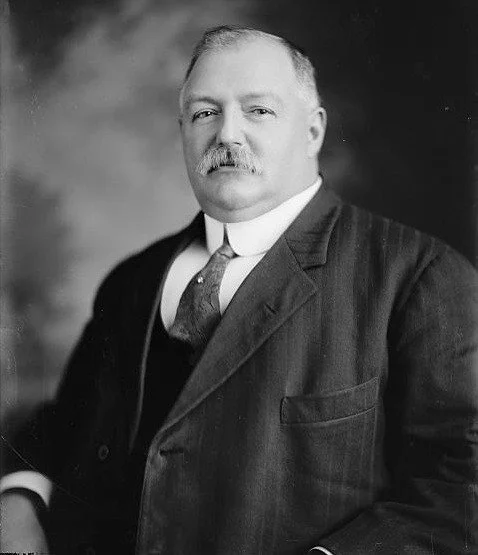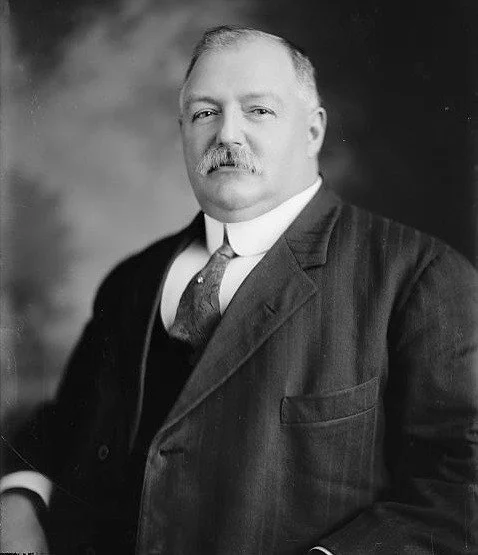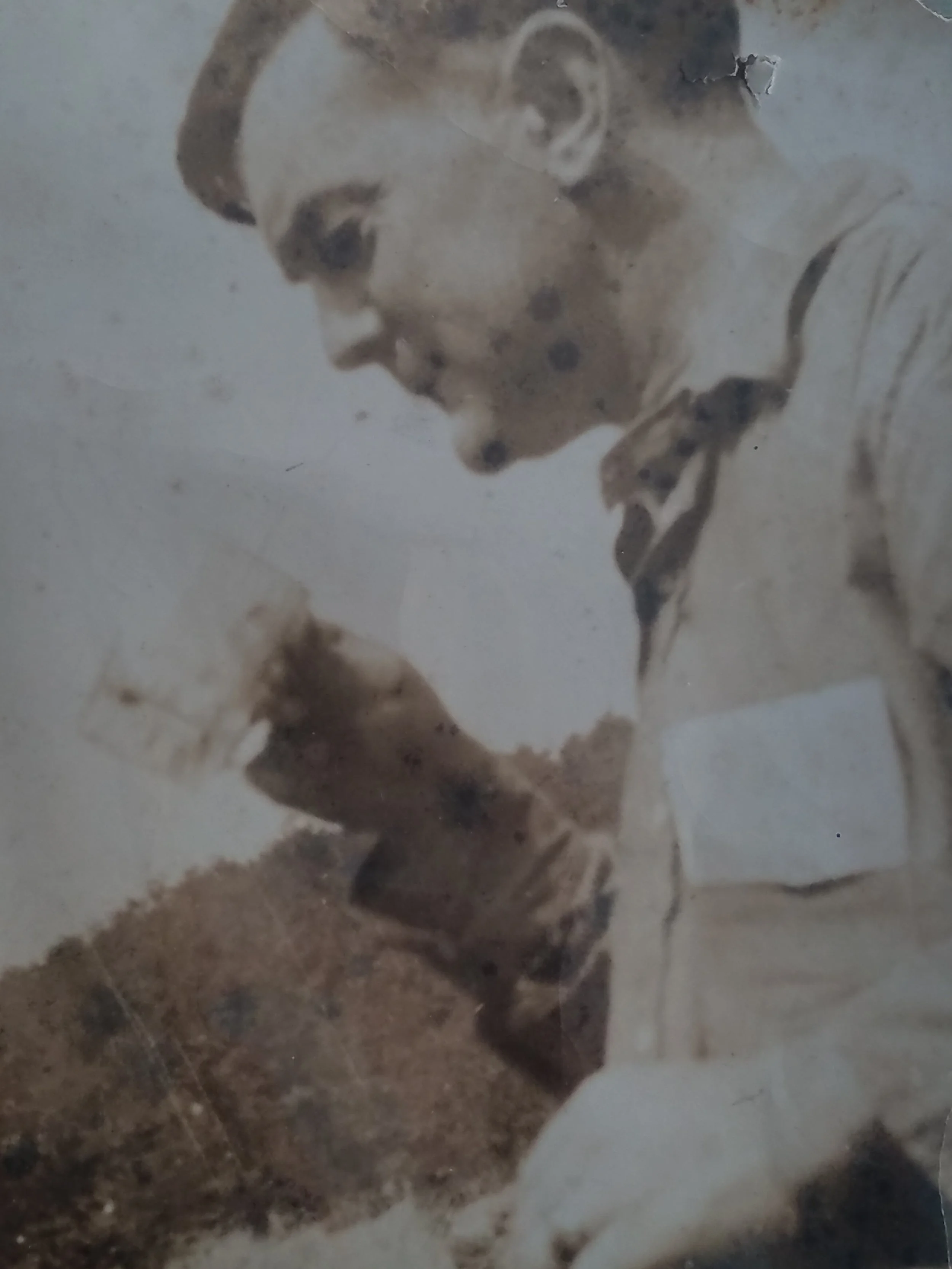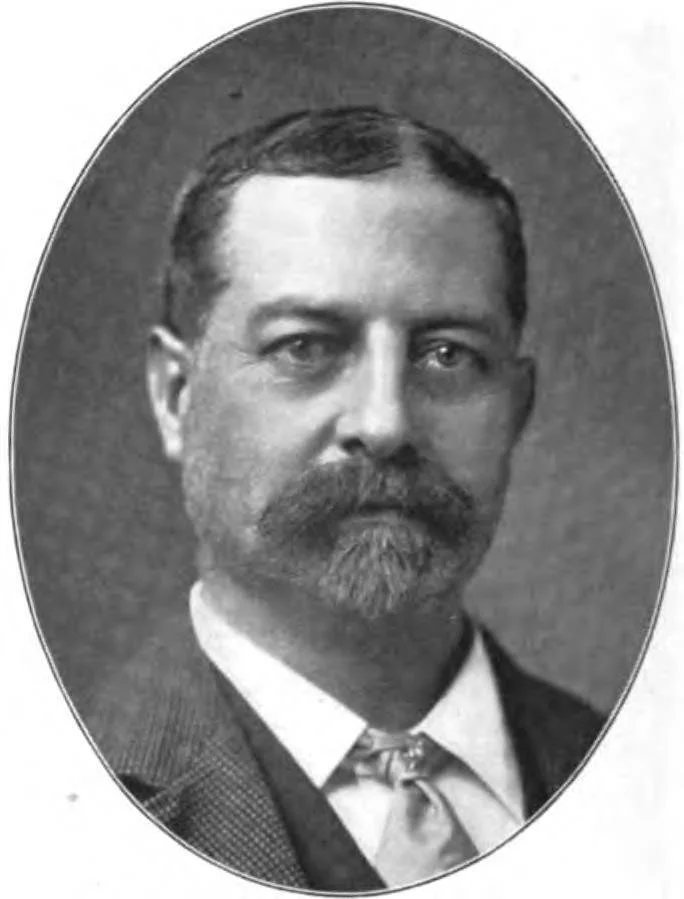The Mystery of the Formal Portraits: Identifying Miles Murtha Lawrence O’Brien
Who was this man? Three unlabeled formal portraits and three generations sharing the same name
When three generations share a name, which Miles are you looking at?
Sometimes genealogy hands you a puzzle wrapped in an enigma. In my family collection, I found three formal portrait photographs—professional, dignified, clearly important enough to preserve for over a century. But there was a problem.
No one knew who they showed.
Well, that's not quite true. There was one clue: a severely degraded photocopy with handwriting that read "Miles M O'Brien - Dad's Father - Died 1930-March?"
But which Miles M. O'Brien? In my family, that name echoes across three generations like a bell ringing through time.
The only labeled photo—severely degraded, but the handwriting was clear: 'Miles M O'Brien - Dad's Father - Died 1930’
The Challenge: Three Miles O'Briens
Here's what made this identification so tricky:
Miles Murtha Lawrence O'Brien (1873-1930)
The grandfather. Born in Jamaica, Queens. Worked as a scale maker in Brooklyn. Died at 56.
Miles Murtha O'Brien (1904-1984)
The father. Also born in Brooklyn. My mother's father. Lived to 80.
Both men lived in Brooklyn. Both had formal portraits taken. Both were named Miles.
So when I found three unlabeled formal photographs clearly showing a middle-aged man from the early 20th century, I had to ask: which Miles am I looking at?
The Photos: What We Could See
Photo 1 & 2: Two formal studio portraits showing the same man at similar ages. Professional photography, high-quality, clearly expensive portraits from prestigious studios. The man appears to be in his late 30s to mid-40s, wearing the formal three-piece suits typical of the 1900s-1910s era.
Photo 3: A much more degraded image showing a man in profile, outdoors, holding a cup. Poor quality, casual snapshot style.
The labeled photocopy: So damaged that the face was almost completely gone. But the handwriting was clear enough: this was "Dad's Father" who died in 1930.
That had to be Miles Murtha Lawrence O'Brien (1873-1930). But could I prove the other photos showed him too?
Mystery Portrait #2: Same man, similar age, formal studio setting
Clue #1: Dating Through Fashion and Photography
First, I needed to date these photographs. Every era has distinctive photographic styles and fashion elements that act like fingerprints in time.
What the Photos Told Me:
Studio Style:
Professional portrait studios with painted backdrops
High-quality printing on thick card stock
Formal posing with studio furniture/props
This level of formality and expense = 1900-1920 era
Fashion Details:
High white collar with dark necktie (Edwardian style)
Three-piece dark suit
Hair: Short, parted, styled with pomade
Clean-shaven or neatly trimmed facial hair
Dating: 1905-1920
Subject's Apparent Age:
Mature features but not elderly
Appears to be 35-50 years old
If photographed 1905-1920, subject born approximately 1855-1885
This gave me a working timeline. Now I needed to match it to real people.
Placing the mystery photographs in Miles's lifetime
Clue #2: The Family Tree
Let me introduce you to the O'Brien family of Brooklyn—a family that illustrates the promise and complexity of Irish-American immigrant success in the early 20th century.
The Father: Terrence O'Brien (1833-1874)
Irish immigrant who settled in Jamaica, Queens. Died when his younger son was just one year old.
His Sons (Half-Brothers):
James Henry O'Brien (1860-1924)
The older son, from Terrence's first marriage. Rose to become a US Congressman representing Brooklyn. A prominent political figure, successful, well-connected. We have clear photographs of James Henry in his later years—a stocky man with a prominent mustache, the bearing of someone used to authority and public attention.
Miles Murtha Lawrence O'Brien (1873-1930)
The younger son, from Terrence's second marriage. Born 13 years after his half-brother. This is my great-great-grandfather, the man I'm trying to identify in these photographs.
The Next Generation:
Miles Murtha O'Brien (1904-1984)
Son of Miles Murtha Lawrence. My mother's father. We have excellent photos of him throughout his life: wedding photos from the 1920s, middle-age photos from the 1950s, elderly photos from the 1970s.
Three generations of O'Brien men in Brooklyn—which Miles are we looking at?
Clue #3: The Half-Brothers
The relationship between James Henry and Miles Murtha Lawrence fascinated me. Here were two half-brothers, 13 years apart, who both made lives for themselves in Brooklyn despite their father dying young.
James Henry became a Congressman—the kind of success story newspapers loved to celebrate about Irish immigrants' children.
Miles Murtha Lawrence became a scale maker, working in Brooklyn's manufacturing sector. A skilled tradesman, solid middle-class living.
And here's what made me pause: In 1918, when Miles Murtha Lawrence had to register for the WWI draft, he listed his employer as James H. O'Brien.
His half-brother, the Congressman.
Miles Murtha Lawrence, at age 45, was working for his older half-brother's business or enterprise. The successful politician and the skilled tradesman, bound by blood and by business.
This told me something important: Miles Murtha Lawrence had the means and reason to have formal studio portraits taken. He was connected to a prominent family. He worked in a respectable trade. These weren't the portraits of a struggling laborer—these were the portraits of a man with standing, with connections, with something to prove or preserve.
James Henry O'Brien (1860-1924), US Congressman from Brooklyn—Miles's half-brother and employer
Clue #4: The Breakthrough—A Physical Description
Here's where the detective work got exciting.
I found Miles Murtha Lawrence O'Brien's WWI Draft Registration Card from September 12, 1918. He was 45 years old at the time, required to register despite being well past prime military age.
And on that card, I found what every photo detective dreams of finding: an actual physical description.
Height: Medium
Build: Medium
Eye Color: Grey
Hair Color: Grey (at age 45)
Suddenly, I wasn't just guessing. I had facts.
Miles Murtha Lawrence O'Brien's WWI Draft Registration Card, September 12, 1918—the breakthrough that provided a physical description
The Comparison: Does It Match?
Now I could go back to those formal portraits with new eyes.
The man in Photos 1 & 2:
Build: Medium ✓ MATCHES
Height: Medium (based on proportions) ✓ MATCHES
Age: Appears 35-50 years old ✓ MATCHES
Timeline: Photos dated 1905-1920 = Miles would be 32-47 years old ✓ PERFECT MATCH
By 1918, Miles had grey hair at age 45. So if these photos were taken around 1910-1915 (when he was 37-42), his hair would have been darkening but not yet fully grey. Which is exactly what we see in the portraits.
The photos show a man in his prime working years, successful enough to afford expensive studio portraits, connected enough to care about his image and legacy.
This had to be Miles Murtha Lawrence O'Brien.
The Evidence Converges
Let me show you how multiple independent lines of evidence all pointed to the same conclusion:
Photography Technology: Tintypes and cabinet cards = 1900-1920 ✓
Fashion Dating: Edwardian suits, high collars = 1905-1920 ✓
Studio Quality: Expensive professional portraits = person of some means ✓
Subject's Age: Appears 35-50 in photos ✓
Physical Description: Medium build, medium height ✓
Birth Year Math: Born 1873, photographed ~1910-1915 = age 37-42 ✓
Family Context: Working for congressman brother = reason for formal portraits ✓
Geographic Match: Brooklyn studios, Brooklyn resident ✓
When this many clues point in the same direction, you have your answer.
Photographed circa 1908-1918, age 35-45
Scale maker, working for Congressman brother
Died January 13, 1930, Brooklyn, NY
Father to ten children including Miles Murtha O'Brien (1904-1984)
Nine independent clues all pointing to the same conclusion
What About the Third Photo?
That degraded profile shot—the man outdoors with a cup—remains more mysterious.
It could be Miles Murtha Lawrence in the late 1920s, shortly before his death in 1930. The casual snapshot style and outdoor setting fit with the 1920s era of portable cameras.
Or it could be his son, Miles Murtha O'Brien, photographed in the 1950s-1960s. The photo quality is too poor to say definitively.
Sometimes you have to accept that not every mystery can be completely solved. But two out of three isn't bad.
The degraded profile shot—the man outdoors with a cup—remains more mysterious.
The Bigger Picture: Brooklyn's O'Brien Dynasty
As I researched Miles Murtha Lawrence, I discovered something else fascinating. His 1930 obituary doesn't just list his family—it makes a point of mentioning he was "related to the late Miles M. O'Brien, former president of the Board of Education."
Miles Murtha Lawrence O'Brien's 1930 obituary, noting he was 'a member of a well-known family’
Another Miles O'Brien. Another prominent Brooklyn figure.
I don't yet know exactly how they were related. Cousin? Uncle? More distant connection? But the fact that the obituary mentions him tells me something important: this was a family that mattered in Brooklyn. When you died, the newspaper noted which other O'Briens you were connected to, because readers would recognize those names.
Miles Murrough O'Brien, former president of Brooklyn's Board of Education—another O'Brien in positions of prominence. Exact relationship to Miles Murtha Lawrence remains to be discovered.
The O'Briens weren't just surviving in Brooklyn—they were thriving, building influence, creating a legacy.
James Henry the Congressman.
Miles M. the Board of Education President.
Miles Murtha Lawrence the skilled tradesman.
Multiple branches of one Irish immigrant family, all making their mark on Brooklyn in the early 20th century.
Three Generations, One Name
Looking at all the photos together now—the formal portraits of Miles Murtha Lawrence, the wedding photos of his son Miles Murtha O'Brien, the family photos of grandson and great-grandchildren—I can see the thread running through them.
The same name, carried across three generations. The same borough, home to all three men. The same determination to succeed, to build something, to leave a record.
Miles Murtha Lawrence never lived to see his grandson. He died in 1930 when his son was only 26 years old. But the name continued. The legacy continued.
And now, nearly 95 years after his death, I can look at his face in those formal portraits and say with confidence: This is Miles Murtha Lawrence O'Brien. Born 1873. Died 1930. Scale maker. Brother to a Congressman. Father to Miles. Great-great-grandfather to me.
Found.



Three O'Brien men across three generations: James Henry (uncle), Miles Murtha Lawrence (grandfather), Miles Murtha (father)
Miles Murtha O'Brien (1904-1984) at his wedding, circa 1925—the son named for his father
Lessons for Your Own Photo Detective Work
If you're trying to identify old family photographs, here's what worked for me:
1. Date the Photo First Use technology type, photo format, fashion, and studio style to narrow down when the photo was taken. This gives you a timeline to work with.
2. Do the Math If you know when the photo was taken and how old the person appears, you can calculate their approximate birth year. Then match that to people in your family tree.
3. Hunt for Physical Descriptions Draft cards, passports, prison records, military records—many documents include height, build, eye color, and hair color. These are gold for photo identification.
4. Consider Context Why would this person have had this type of photo taken? Who could afford it? What was the occasion? Context clues matter.
5. Look for Family Resemblance If you have confirmed photos of siblings, parents, or children, compare features. Genetics don't lie.
6. Accept Uncertainty Gracefully Sometimes you'll reach 95% confidence. Sometimes only 70%. Document what you know, what you believe, and what remains uncertain.
The Power of Names
Miles Murtha Lawrence O'Brien lived 56 years. He worked in Brooklyn's scale manufacturing industry. He married Anna T. McGuire. He raised ten children—five sons and five daughters. He died at home on Milford Street in January 1930.
For decades, his photographs sat in family collections, carefully preserved but unnamed. Three generations later, no one remembered which Miles they showed.
But we found him.
We found him through fashion and photography, through draft cards and obituaries, through patient detective work and the stubborn refusal to let his face remain nameless.
Every photograph in your collection was someone's ancestor. Every formal portrait represented a moment when someone said, "This matters. I want this remembered."
Miles Murtha Lawrence O'Brien mattered. And now we can remember.
Your Turn
Do you have unidentified formal portraits from the early 1900s? Old photographs of men in suits or women in Edwardian dress, carefully preserved but nameless?
Connect with me on Facebook or via my contact form and share your mystery photos. Sometimes fresh eyes can spot the clues we've been missing. Let's help each other bring our ancestors' faces back to life.
If this post helped you, please share it with someone who has their own box of mystery photographs. Miles Murtha Lawrence waited nearly 95 years for his name to be spoken again—maybe your ancestors are waiting too.
Every face deserves a name. Every story deserves to be told.
Want to dive deeper into photo identification techniques? Check out my other case studies:
Want to Know When New Stories Are Published?
Subscribe to receive updates on new family history research—no spam, just meaningful stories when there's something worth sharing.
SUBSCRIBE TO OUR NEWSLETTERReady to Discover Your Family's Story?
Let's explore your family history together. Schedule a free consultation to discuss your research goals and how we can help bring your ancestors' stories to life.
Schedule Your Free Consultation








